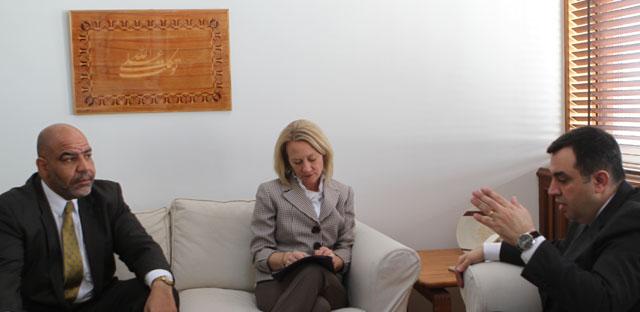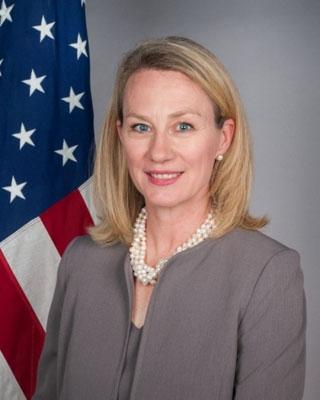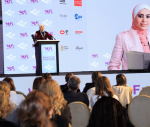You are here
Eyes of world are on Jordan now — US ambassador
By Dana Al Emam - Feb 19,2015 - Last updated at Feb 19,2015
AMMAN — The fight against the Daesh terrorist group is not exclusive to soldiers and airmen; it extends to teachers, entrepreneurs and civil society leaders, according to US Ambassador to Jordan Alice G. Wells.
“There is no better answer to the false promises of extremism and the dismal future promised by Daesh than the powerful example of Jordan’s own success,” Wells said at a lecture on Wednesday evening, warning that winning the war will not be easy.
She added that “the eyes of the world are on Jordan now” as a country whose choices affect the world’s future, highlighting the efforts of the Kingdom’s leadership and institutions to further encourage inclusiveness and governance, in contrast to Daesh doctrine.
At the event, organised by the Arab Thought Forum, the diplomat said Jordan is an embodiment of tolerance, a value threatened in a region facing an “uncertain future”.
Wells cited the recent amendments to Jordan’s Constitution as a measure that seeks to build a “stable system of government” that is truly representative of the will of the people, as well as the establishment of institutions that promote transparency, including the integrity committee, the Independent Elections Commission and the Anti-Corruption Commission.
US assistance
The ambassador underscored the friendship between her country and Jordan, which dates back over 65 years, expressing Washington’s interest in investing in the future of the Kingdom.
“By the end of this fiscal year, total direct US assistance to Jordan since its founding will surpass $15 billion,” Wells said, citing assistance in the water, health, education and military sectors.
“In the last 15 years, our assistance has totalled nearly $825 million in the water sector,” she said.
Moreover, the US has contributed to modernising over 300 medical clinics and 25 hospitals, with over 70 per cent of Jordanians being born today at hospitals renovated with assistance from USAID, according to Wells.
“Since 2003, the United States has invested almost half-a-billion dollars in Jordan’s education system,” she said, noting that the assistance included training courses for teachers, building model schools, as well as renovating and expanding others
Moreover, annual support for the Jordan Armed Forces-Arab Army since the turn of the century stands at over $300 million, the ambassador said, and the US is “prioritising assistance to Jordan to ensure deliveries of new military equipment will occur without delay”.
Also, Washington has provided support for refugees in Jordan as the largest individual funder of UNRWA, in addition to providing the Kingdom with nearly $500 million to provide food, clothing and shelter to Syrian refugees.
“We will pledge even more at the next conference of international donors in Kuwait, and we will continue to deliver that support quickly and efficiently,” she said.
The ambassador cited a recently signed agreement, under which the United Sates will upgrade its assistance to Jordan from $660 million to $1 billion per year through 2017.
“We have extended to Jordan an unprecedented $2.25 billion in loan guarantee agreements that will save [the country] hundreds of millions of dollars in interest payment in the years to come,” she noted.
Highlighting the role of the private sector in employing young job seekers, Wells said US private investments contribute to providing “well-paying” jobs to Jordanians.
Since the 2001 US-Jordan Free Trade Agreement, the volume of trade between the two countries increased over eightfold, growing from some $400 million to over $3.4 billion annually and creating some 50,000 jobs for Jordanians.
The volume of US investments in Jordan stands at $2.2 billion, according to Wells, who cited Hikma Pharmaceuticals and Petra Engineering Industries Company as successful Jordanian investments in the US.
The diplomat highlighted the partnership between US renewable energy firms and their Jordanian counterparts, as American firm Sun Edison is investing $70 million to build a 20-megawatt renewable energy power plant in Maan, some 220km south of Amman.
Wells called for supporting innovation and emerging entrepreneurs to boost sustainable economic growth at home “rather than watching them flourish abroad”, citing Jordan as a “global hub” for the IT industry as it produces up to 75 per cent of the Internet’s Arabic content.
She also called for boosting women’s participation in economic and political life, especially since they outnumber men among university graduates and achieve the highest scores in the General Secondary Certificate Examination.
Highlighting the role of inter-Arab trade in improving the trade performance of the region, as trade within the Middle East and the North Africa region constitutes only 10 per cent of the region’s total exports, she noted that Arab countries trade with the EU “far more than they do with one another”.
“We will stand with our friends, united in our common purpose,” Wells concluded.
Related Articles
Planning and International Cooperation Minister Imad Fakhouri on Saturday discussed US economic assistance to Jordan with Ambassador Alice G. Wells.
AMMAN—Tuesday’s Leaders’ Summit in New York will build on international efforts to address the refugee crisis and keep the momentum mo
AMMAN — ICT Minister Majd Shweikeh met separately on Sunday with UAE Ambassador to Jordan Bilal Al Budoor and US Ambassador to Jordan Alice


















